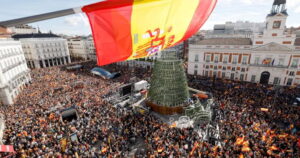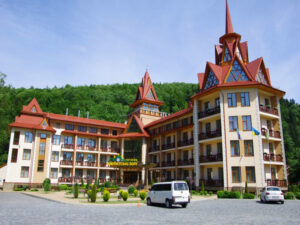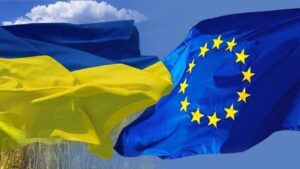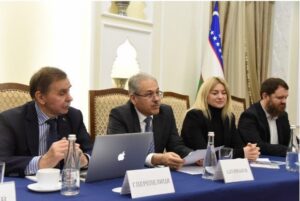
According to the project Relocation.com.ua, Spain has become the largest “issuer” of first residence permits (first residence permits) in the European Union in 2024, followed by Germany and Poland, according to Eurostat data.
According to statistics, Spain issued 561.64 thousand first residence permits, Germany – 544.987 thousand, Poland – 488.846 thousand, Italy – 346.411 thousand, France – 342.208 thousand. European Commission
These five countries together accounted for 65.1% of all first residence permits issued in the EU in 2024. In total, EU countries issued 3.5 million first residence permits to non-EU citizens in 2024, 8.3% less than in 2023.
http://relocation.com.ua/spain-and-germany-lead-the-way-in-issuing-the-first-npi/

Hotel occupancy in the Carpathians in winter 2026 is expected to be 85-95%, and in cities — 50-65%, according to a study by the Ribas Hotels Group.
According to analysts, an increase in average hotel occupancy is expected in mountainous regions. With normal snow cover, peak occupancy in Bukovel will be 85-95%.
In cities, according to Ribas Hotels Group forecasts, hotel occupancy will be approximately 50-65%. Winter hotel occupancy in Odesa will reach 45-65% depending on the concept of the enterprise.
According to a survey conducted by the company, this year people prefer aparthotels and cottages that satisfy their need for privacy and autonomy. City business hotels are also in stable demand, allowing guests to work comfortably thanks to quiet areas and uninterrupted internet.
Among the trends is an increase in group bookings among different population groups. Stable demand in December and February comes from corporate groups. An increase in interest among families and friends is expected, with the number of family bookings likely to grow by 10–15% and the size of “groups of friends” from 4–6 to 6–8 people. This is why there is a growing need for family rooms, two-room apartments, and cottages, which necessitates booking rooms for groups in advance during peak dates. In 2026, a significant increase in the “booking window” is predicted — from 7–14 days to 21–35 days.
“Guests are taking vacation planning more seriously. In search of more favorable offers, they prefer early bookings with a fixed price,” the company’s analytics note.
This winter, there has been a 25-30% increase in direct bookings through the website. At the same time, although OTA platforms such as Booking, Expedia, etc. provide stable demand, their share is declining to 10-20% this winter season. The most effective booking channels are currently social networks (especially Instagram/Telegram) and quick sales through administrators and chatbots (up to 60%). This is due to their convenience, transparent special offers, more active advertising, and bonuses for repeat guests.
“For the first half of 2026, we predict the rise of major trends: guests’ desire for comfort and privacy, hyper-personalization of service, and the workation format (combining leisure with work). Due to affordability, people are traveling more often within Ukraine and spending more time on travel. A partial return of deferred demand is expected this winter season,” the study notes.
A number of factors influence the dynamics of domestic tourism: transportation prices, stability of energy supply in hotels, and healthy lifestyle trends. That is why the number of wellness hotels is actively growing in Ukraine.
Ribas Hotels Group is an international management company founded in 2014 in Odesa, whose flagship service is the operational management of hotel and restaurant complexes. The company also provides services in concept development, design, support for all stages of project implementation, consulting, and franchising for developers.
The company comprehensively manages and exclusively books 28 city, beach, and ski hotels under the Ribas Hotels, Ribas Rooms, WOL home + hotel, and Mandra Glampings brands. The operator’s total room capacity is over 1,000 rooms. In total, the portfolio includes more than 50 projects, including those in the design and construction stages. The company is also currently developing properties in Poland and Indonesia.

Citizens of Ukraine have become the largest group among the recipients of first residence permits in the EU in 2024, according to Eurostat data. According to the EU statistical agency, in 2024 EU countries issued 295.6 thousand first residence permits to Ukrainian citizens, followed by citizens of India (192.4 thousand) and Morocco (188.4 thousand).
Eurostat also indicates that for Ukrainians the most frequent reason for obtaining the first residence permits was employment: 72.5% of permits for Ukrainian citizens in 2024 were issued on labor grounds.
At the same time, Eurostat emphasizes that the above statistics on first residence permits do not include persons who received temporary protection in the EU countries due to the full-scale war of the Russian Federation against Ukraine – such data are collected separately.

The Embassy of the Republic of Uzbekistan in Ukraine, together with the Institute for Foreign Policy Studies, held a round table on “The Updated Foreign Policy of the Republic of Uzbekistan.” The event was attended by diplomats, experts, and analysts. Participants discussed the transformation of Uzbekistan’s foreign policy against the backdrop of global turbulence, growing interstate conflicts, and the restructuring of the international relations system.
It was noted that under the presidency of Shavkat Mirziyoyev, Tashkent is stepping up its international activity and consistently forming new areas of cooperation, paying attention to strengthening good neighborliness and trust in Central Asia, developing multi-vector political and economic ties, and diversifying trade and investment.
Other priorities included expanding cooperation in the areas of transport and logistics, green energy, water management, and the climate agenda. The participants emphasized the practical effectiveness of economic diplomacy and the growth of Uzbekistan’s interaction with international organizations, noting the holding of major international events in the country under the auspices of the Inter-Parliamentary Union and UNESCO.
A separate section of the discussion was devoted to Uzbekistan’s cooperation with the European Union. Experts pointed to the convergence of interests between the parties on issues of energy security, sustainable transport corridors, the green economy, water management, as well as educational and humanitarian programs, emphasizing Uzbekistan’s role as one of the EU’s key partners in Central Asia.
The cultural and humanitarian component of foreign policy was also discussed, including the development of cultural diplomacy and tourism as tools for strengthening the country’s positive international image and “soft power.”
At the end of the round table, participants described Uzbekistan’s foreign policy as open, pragmatic, and predictable, based on internal modernization and a reform agenda.

The gross corn harvest in Ukraine in the 2025 season was collected on an area of 87% of the sown area and amounted to 27.5 million tons with an average yield of 7.13 tons/ha, analysts at brokerage company Spike Brokers reported on Telegram.
According to their estimates, as of December 25, 2025, an average of about 551,000 hectares of unharvested corn remained in Ukraine.
“With the current average yield in the country at around 7.1 t/ha, this forms a basic potential for an additional harvest of about 4.0 million tons,” the brokers emphasized.
They noted that the key unharvested areas are concentrated in regions with significantly higher than average yields. The largest residues are recorded in the Sumy region (93 thousand hectares with a yield of 8.0 tons/ha), Zhytomyr (56 thousand hectares and 7.7 tons/ha), Chernihiv (49 thousand hectares and 8.8 tons/ha), Kyiv (29 thousand hectares and 9.2 t/ha) and Cherkasy (29 thousand hectares and 7.0 t/ha) regions.
“According to estimates of the harvesting potential, taking into account the actual yields of these regions, the total additional harvest in key regions alone may exceed 2.3 million tons. Taking into account the rest of the regions, the final harvest potential may exceed the baseline estimate and approach 4.3-4.5 million tons,” experts say.
They noted that corn exports through seaports have slowed down, leading to a further decline in prices. Increased risks and additional costs of exports through seaports continue to put pressure on prices in this direction. The spot corn index with CPT port delivery (30 days) fell to $204 per ton.
“If prices continue to fall by at least $5 in the direction of seaports, the western border will begin to form a competitive alternative for a number of regions in central Ukraine. At the same time, supply continues to grow in the direction of the western border: FCA Chop deals with delivery in March-May were concluded at EUR180,” Spike Brokers summarized.

The crypto market ended 2025 significantly weaker than most traditional asset classes. According to Fixygen’s estimates, Bitcoin fell by 5.75% over the year, Ethereum by 11.58%, and the altcoin sector by 42.27%. Fixygen
At the end of December, the market remained in a state of low liquidity and consolidation, with BTC and ETH trading around $88,000 and $3,000, respectively.
The key story of 2025 was strong growth to autumn highs and a subsequent sharp correction. Fixygen noted that the decline was exacerbated by derivatives and the forced closure of short positions worth about $19 billion. Fixygen In November, according to Fixygen analysts, the cryptocurrency market lost more than $1 trillion in capitalization amid profit-taking, deteriorating risk appetite, and outflows from exchange-traded funds. Fixygen
The end of the year was marked by a thin market and the impact of major events in derivatives: Fixygen pointed to the effect of low holiday liquidity and discussion of a large expiration of options on Deribit as a potential trigger for short-term volatility. Open4Business
Trends for 2025
1. Crypto is increasingly being traded as a risk asset alongside the macro agenda. This was evident, in particular, through sensitivity to interest rate expectations and overall market sentiment, as well as through participants’ discussions about ETF flows.
2. Rotation within the market: after overheating, capital sought more stable segments. The tokenization of real assets and the growth of infrastructure around RWA and stablecoins stood out: according to RWA.xyz, the total value of tokenized RWA on public blockchains is about $19.17 billion, and the stablecoin market is about $298 billion.
3. Regulation became part of investment risk and part of the industry’s “legitimization”: 2025 brought noticeable regulatory changes and increased attention to compliance in various regions.
The near future: baseline scenario and crossroads
The baseline scenario for early 2026 is continued consolidation after a volatile fall, when the market will “digest” the correction, and dynamics will largely remain dependent on the macro background, capital flows, and the news agenda.
Further on, the fork is simple. The positive scenario is a return of steady demand from large investors and a restoration of risk appetite, which usually supports BTC and then triggers a selective “second wave” in liquid altcoins. The negative scenario is a new wave of risk-off (due to rates, geopolitics, or regulatory surprises), in which altcoins, as the riskiest segment, feel the pressure the most — this was already evident at the end of 2025.